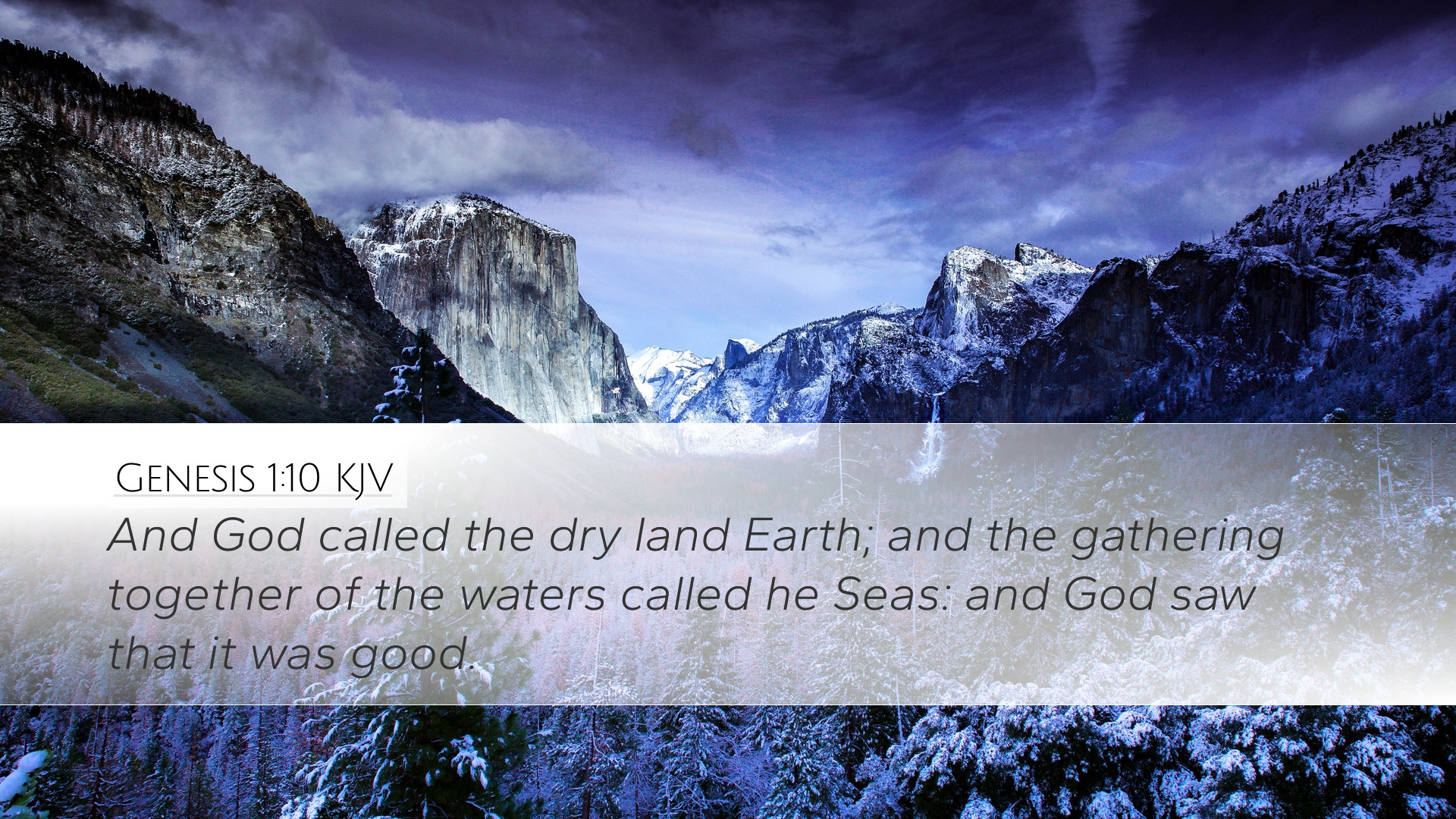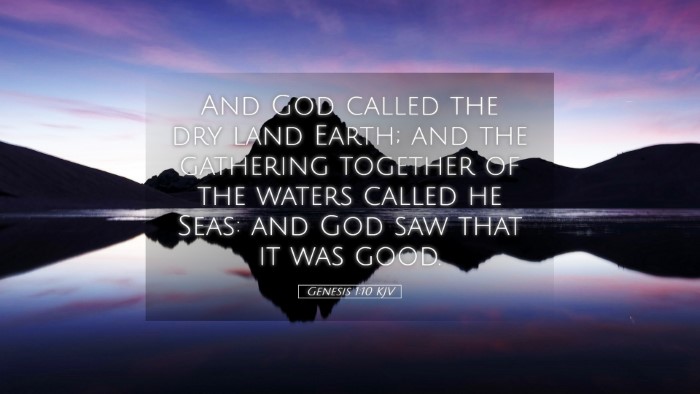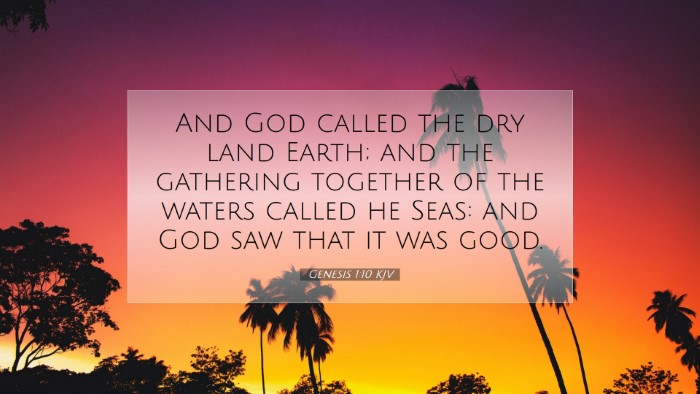Commentary on Genesis 1:10
Verse Context: Genesis 1:10 reads, "And God called the dry land Earth; and the gathering together of the waters called he Seas: and God saw that it was good." This verse is situated within the Creation Narrative, where God systematically brings order to chaos, which is a central theme throughout the opening chapter of Genesis.
Exegesis and Theological Insights
The significance of this verse extends beyond mere nomenclature. It embodies the divine act of categorization and the establishment of boundaries, which have profound theological implications.
1. God’s Sovereignty in Creation
As articulated by Matthew Henry, this section of creation illustrates God’s authority as the Creator. By naming the dry land "Earth" and the gathered waters "Seas," God not only defines these entities but also asserts His dominion over them. This creative act emphasizes that creation is subject to God’s will.
2. Order from Chaos
Albert Barnes expounds on the idea that God’s call to separate land from water represents an essential transition from formlessness to order. The chaotic waters represent a world without structure, and God's command brings about a functional cosmos, which is a recurring theme in ancient Near Eastern creation accounts.
3. The Goodness of Creation
Moreover, the concluding phrase, “and God saw that it was good,” signifies God’s approval of His creation. Adam Clarke notes that this declaration not only reflects the qualitative nature of creation but also illustrates the inherent value present in the world God created. It sets a theological precedent that creation is fundamentally good and that evil is a corruption of God’s original design.
Symbolism and Meaning
This verse is replete with symbolic meaning, particularly in how it relates to the themes of identity and provision.
1. Identity through Definition
When God defines the land and the seas, He imbues them with purpose and identity. Henry emphasizes that names convey identity, and in this initial act, we see the establishment of the natural world's framework. The earth is designated as a realm for habitation, while seas represent boundaries that direct life. Such definitions are critical in understanding not just creation but the nature of God’s relationship with it.
2. Provision and Sustainability
Creation narratives set the stage for understanding God as provider. Barnes highlights that with the establishment of land, God sets the stage for agriculture, habitation, and community life. The seas, by their gathering, not only imply boundaries but also signify the water necessary for sustaining life. In recognizing God’s provision, believers learn to trust in His goodness and sovereignty.
Cultural and Historical Context
Understanding Genesis 1:10 also benefits from examining the historical and cultural context in which it was written. The ancient Near East was dominated by polytheistic beliefs that often associated gods with elements of nature.
1. Distinction from Ancient Near Eastern Myths
Genesis presents a monotheistic perspective that contrasts sharply with surrounding myths, where gods were seen as competing for control over the cosmos. The clear delineation of "Earth" and "Seas" serves as a statement against chaos and disorder often present in other traditions, validating the supremacy of the Hebrew God. Clarke highlights that these acts of separation distinguish the Creator's unique identity in contrast to the gods of the nations.
2. Influence on Later Scriptures
Furthermore, the themes initiated in Genesis 1:10 reverberate throughout the biblical narrative, establishing a foundation for understanding God's ongoing relationship with creation. Subsequent texts reflect on this goodness, especially in the psalms, which echo creation’s praise of its Creator. This foundational event also sets the stage for humanity’s role as stewards of creation, an important theological implication for pastoral care and environmental ethics.
Application for Today
This passage holds vital lessons for contemporary faith communities, including the recognition of God's sovereignty, the acknowledgment of the goodness of creation, and our responsibility towards it.
1. Acknowledging God’s Sovereignty
Believers today are called to recognize God's authority in both creation and their lives. A strong theology of creation fosters an appreciation of God's power and presence in the world, countering contemporary nihilism and despair.
2. Relationship with Creation
In light of the environmental crises facing the world, understanding Genesis 1:10 as an affirmation of the goodness of creation compels Christians to engage in stewardship. As articulated by Barnes, recognizing the earth as created good challenges believers to respond to issues of ecological degradation with compassion and responsibility.
3. Community and Identity
For pastors and church leaders, the message of identity and purpose seen in this verse can inform community-building efforts. Like the distinctions between land and sea, the church is called to embrace diversity within unity, appreciating the unique callings of its members while pointing them towards a shared mission.
Conclusion
In Genesis 1:10, profound truths about God, creation, and humanity are revealed that are applicable across theological scholarship, pastoral ministry, and personal faith. The verse encapsulates central themes such as God’s sovereignty, the inherent goodness of creation, and our spiritual and ethical responsibilities as reflections of our Creator. By drawing from the insights of Matthew Henry, Albert Barnes, and Adam Clarke, we find a rich tapestry of meaning that challenges and inspires contemporary readers toward deeper faith and action.


